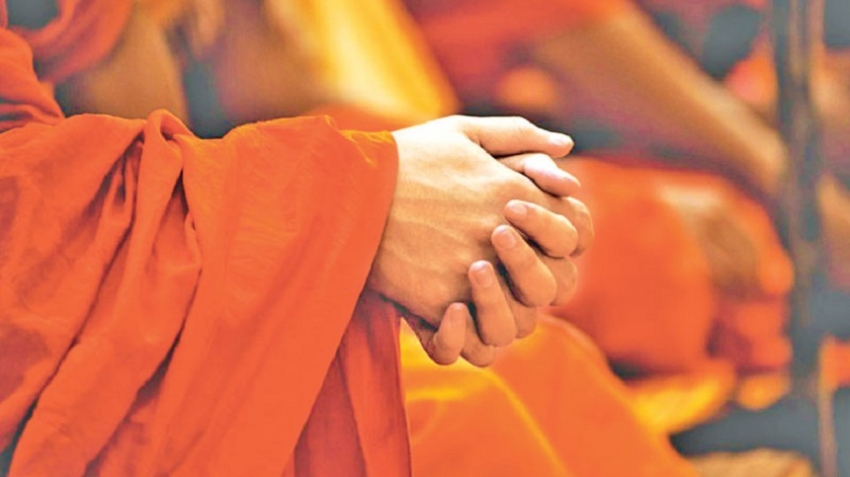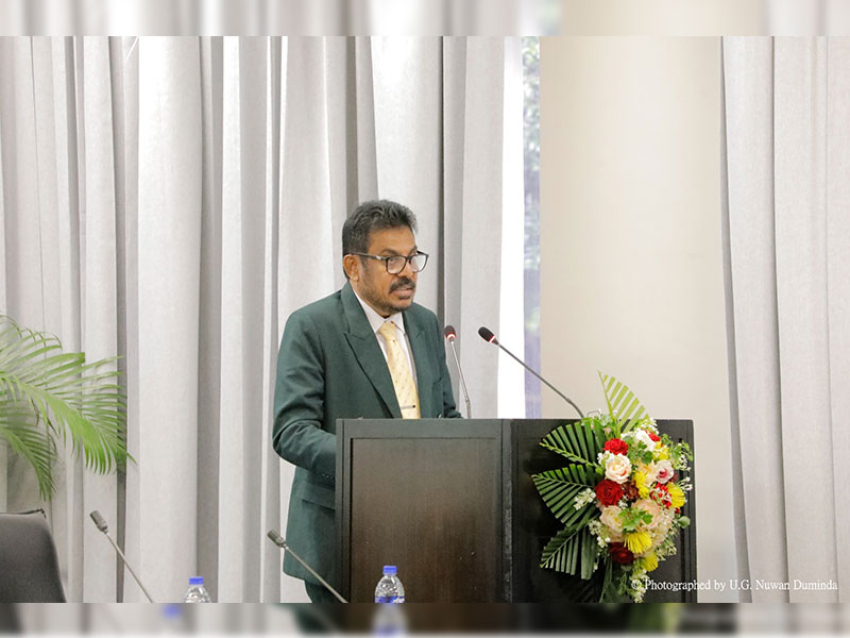The fundamental nature of Buddhism is based on the human being, and what the human being is. The Buddha found there was one fundamental problem that everybody had. And that was the problem with discontentment. Everybody is discontented, nobody is contented at all.Discontentment is really our motive for doing things. We do things because we think it’s going to bring us more contentment. Sometimes discontentment becomes rank suffering, sometimes it’s just little irritations, but always it’s there. And this, the Buddha saw, was the fundamental problem that everybody had. And everybody is trying to overcome it all the time by big ways or small ways. Everybody, it doesn’t matter whether they are Buddhist or what they are. He saw that this was the problem.
He analysed this problem and he saw that this problem came from craving. The wanting all the time. And with this wanting one’s mind constantly goes out and searches for things. Then desire comes up and it wants to get that thing and goes out to grab that, whatever it is. And when it does that, then it tries to satisfy by that means this discontentment. But when it goes out to grab things like that it also produces a state of attachment to the objects it grasps after. When it gets things which it like it wants these more and more. They get attached to them. When they find things they dislike they want to get rid of them. And then they get attached to not wanting those things as well. When we have this attachment, this keeps us going on in the way that we set up the situation in the past. In other words we’ve set up attachment to things; those attachments come up time after time after time, and lead us in the same way.
Endless life
This causes us to go, until we come to the end of our life. And when we come to the end of our life there is the remainder of what we’ve got within us; of the seeds of what we’ve planted by our actions.So we go on the next time. And the same sort of thing happens and we go on the next time. We go on and on and on like this.
Most people want endless life. But in fact, if they realised the nature of it, they wouldn’t. They would see that the only thing to do is to try and stop this. To try and get to some satisfaction. Something really satisfactory. The trouble is that we always want things based upon, (What we call the Kilesas) the defilements within ourselves.
These defilements are greed, hate and delusion. These are caused by fundamental ignorance. The ignorance in us doesn’t understand what the right way of things are; doesn’t understand what we are, why we are here, where we’ve been, where we’re going to. When people don’t understand this, then they ‘suppose’ all the time. They suppose that this is the right way and that’s the right way. They suppose that if they follow other people it will be right, because everybody’s going that way. And they suppose that if they see something they want they should try and get it. Because they feel that “that something” will make them happy. And they get it, but that just satisfies them for a short while. But then the old habit of wanting comes back again. Very very quickly too. So they keep on doing the same thing time after time.
When people have discontent and they search for the cure to it, they use a method of cause and effect. If somebody had discontent, if they feel bored; they think how can I get rid of this boredom. What will overcome it? And they think of something and they go and do it or they get it or whatever it happens to be. If they have wisdom, they understand the situation, then they do the right thing. And they will in fact bit by bit get rid of that discontent.
The problem is, people have this ignorance in them and they keep doing the wrong thing all the time.
Because they don’t know. This is what the Buddha saw, and he saw in His wisdom the correct way that people should act and how to overcome this situation. The right way is to get rid of this attachment and this craving we have within us. Because if we’re attached, we keep going on in the same old way. And once we have the craving we create that attachment. That attachment comes from craving.So what we have to do is get rid of that craving.Now craving comes because of feeling. We get feelings, we feel discontented, we feel irritated, upset.
Wrong direction
When that feeling arises, then there comes the craving to overcome that feeling. And the person then acts in whatever way they think is going to cure it. And if in fact they had wisdom to see what is the right way, they could do it. But the trouble is, when it comes like that from feeling, feeling giving rise to the craving; immediately they’re on the wrong path, they’re going in the wrong direction to cure it. And this is the way most of the world is going. When most of the world is going like this one is bound to have plenty of trouble in the world. I don’t need to tell you about that I think you know enough about it.
The trouble in the world has always been there one way or another. And it will continue. Because these Kilesas, these defilements, are there in people. And if they’re there in people, there’s bound to be trouble, the whole time.For ourselves, we’ve learned to search, to some extent, for a cure to this, for the right way. Because we’ve learned the right way we can see how to do things properly. So we can slowly learn to undo this situation that we’ve got caught. Because we are caught in a situation. We’re caught in a sort of repetitive process where the results of what we’ve done in the past, keep doing those things which bring us back to those same things in the future. And we just keep rolling along like a wheel, going along all the time on the same path. Sometimes, veering this way sometimes veering that way.And the wise person, when they see this and they realise this; they want to do something about it; they want to get free from the situation. The Buddha taught: when a situation is caused such as this, then if you stop the cause then you can stop the situation. It may not stop straight away; but you’re going towards the ceasing of that situation.
And he taught that if one stops this craving, then one can slowly undo the situation. The results of what one’s done in the past will come out and the whole situation become weaker and weaker. Then one comes to a level of satisfaction and contentment, which one has never had before.If one wants the cessation of discontentment one had got to produce the causes for it. And the causes are what the Buddha called the Path, the Eightfold Path. The path one has to do to overcome this situation. It’s basically made up of moral behaviour, mental training (to control one’s mind) and wisdom. Those are the three things that are necessary. It’s the wisdom that overcomes these defilements within one.
But in order to have the wisdom that will do that, One’s mind has got to be trained up and sharp. It’s like, if you want to cut a tree, you have to sharpen up the axe first. When the axe is sharp enough then you can cut the tree. If you do it with a blunt axe it’s difficult. Similarly one has to train oneself, one has to practice these ways, and slowly if one does that, one will get results.
Morality in Buddhism
Firstly morality: morality in Buddhism concerns only speech and action; not thought. Because thought is subtle. Thought is difficult to control. Morality in Buddhism is: our relation to the world. We have to set up our relation to the world so there are no attachments. So that we can feel free form the world. So that we don’t feel there is any guilt anywhere, or anything pulling us in that direction. If we’ve done bad things and we’re still doing those bad things, then when one sits down to do one’s meditation practice, inevitably those things will come up and cause some trouble. Hence in order to do the meditation practice properly, one has got to be free - free from these guilts. Because of that, the moral practice is absolutely essential.
In the way of the world there are the normal five moral precepts, which we use. These are the minimum behaviour necessary to make the human being. It is said that if one keeps these five moral precepts: the precept not to kill, steal, indulge in wrongful sexual behaviour, use wrong speech (bad speech) and finally to take drinks and drugs (which dull the mind). If one trains oneself to keep these, one will retain ones status as a human being. It is said that if one doesn’t keep those, to that extent one is going below the human level. It is also said that if one trains oneself in higher things than that, one goes to a higher level. The moral training is very important in that respect. In addition if one practices morality, this will bring one a certain degree of contentment. It brings one satisfaction of knowing that one hasn’t done anything wrong, that nobody can rightly claim that one has done something wrong; and one feels freedom from that.
And the contentment that one knows that one’s all right where the world is concerned. And at the same time there will be within one, a certain restlessness, a certain hankering for things, wanting, craving; in other words the discontent is there, but in a more subtle manner. More subtle than the discontent of bad morality. To overcome that discontent one has to train the mind. One trains the mind by putting one’s attention onto a single object or single phenomena. Usually we use the breathing at the tip of the nose.
Some people will use the word “Buddho.”
If one does that and one keeps one’s attention on that, (and the important thing is to keep one’s attention) then steadily the mind will become more and more peaceful. The distractions which one usually has, tend to die away. It can take quite a long time depending on the person. Some people can do it very quickly. With most people it’s quite a job to control the mind.And it doesn’t readily give way to the mediation practice. The reason why it doesn’t give way is because of these defilements within us.
If they weren’t there it would be easy. We’ve got these defilements, they are within us and they keep coming up all the time. They act like demons. They cause one trouble the whole time. So when one does the meditation practice and it’s quite hard work for quite a long time, but steadily the results come. Bit by bit they come. As they come one gets more calm more contentment. One gets a feeling of confidence that one’s on the right path. And when one gets that feeling of confidence, it makes one want to do it more and more the whole time. The practice gradually improves. As you practice of controlling your mind, you become more focused more concentrated and the practice becomes easier. Until one finds that one can get into the practice quite easily. When that happens the mind is well tamed, well controlled. Then it is time to turn and develop wisdom.
One develops wisdom by first of all calming the mind with the practice of calm, the practice of holding the mind there on that single object. Then once it’s calm one turns and one investigates. First of all one’s own body: What is this body? Who’s is it? Where did it come from? Where does it go to? Is this what I call me? What sort of thing is it? Is it pleasant, unpleasant? Is it a joyful thing?
We have to look for ourselves and see; find out for ourselves what the situation is. When we do that we come to see: this body isn’t me, it isn’t mind, the body belongs to the world, it’s part of the world, it’s made up of the world. It’s made up of food. We take food and it goes into the body and it replenishes the body. So we find out that the body is in fact something ‘separate’ from me. When one can see that - that the body is something separate- then one finds that the concern about the body diminishes. One is not so worried about death, one is not so worried about the possibility of getting disease or getting pains and aches. This itself is again where one decreases the discontent, the discontent is gradually dying away.
As one goes on at this, one comes finally to realise in full extent, that the body is completely separate from me, it’s not me, never was me, it belongs to the world. When one’s got to that realisation one’s really far into the practice. Not many people get there. One can then look at the mind and ask oneself what is the mind.
Mind in Buddhism
The mind in Buddhism is made up of four things: feelings, memory, thought, consciousness. Those four! All four of these come from one basic thing - Citta. The citta is the underling thing that’s within one; it’s always there. One way we put it: we call it ‘the one who knows’. The one who knows “is the citta”, it’s the central theme. And the one who knows is the one who’s been trapped. It’s been trapped by turning itself into consciousness, into thought, into feeling, into memory.The whole thing comes from this – “one who knows.” ?This one who knows” is not free and is always causing us trouble. It’s causing us trouble because it’s got these defilements within it.
The defilements are within one’s own heart, and the “one who knows” is within the heart and the Dhamma (the right way) is in the heart. Both of these are in the “one who knows.” If you want to know who the “one who knows” is you will have to ask yourself how you know things. And look and realise that when you see things or hear things you know them. No question about it! And if you see, for example, the colour red, you know that perfectly well for yourself. You know what it’s like -you know the experience. But in no way can you tell anyone else what that experience is. There just isn’t any way you can tell them. You use the word “red” and you rely on the other person’s experience. You rely on the other person having an experience similar to yourself. Really speaking, you don’t know if they see it in the same way as you do or not. If you hear something, you know what you hear, but you don’t know if anybody else hears it the same way as you do or not. All you can say is, that by physiology, that the mechanism of the body is similar in both cases. That doesn’t mean that the experience is necessarily the same. If you try to explain to somebody what a sound is or a particular colour is or anything of that sort, any experience you get, you find you can’t do it.
You have to refer that that person’s experience is the same thing. So if you get somebody who has been blind from birth, you can tell them as much as you like about seeing but they won’t understand. There is no way they can. It’s the one who knows these things is what we call “the one who knows”. That is the one which can become free.
That thing is not physical; it’s not a thing of the world. It only becomes a thing of thing of the world because of these kilesas, these defilements. The one who knows is infected by them. When it’s infected by them it’s got ignorance in it. When it’s got ignorance in it, it hasn’t got confidence in itself. When “the one who knows” has got no confidence in itself, then it has to grab hold of things to have confidence in. So that we have to have things, we have to have other people, other objects, sensations, all sorts like that.Our existence is something that we make up by relationship to all these things that we know.
So what do we call ‘that one’ who is relating to these, we call ‘that one’ myself. But this self that I’ve got is a changing thing, it’s not the same thing from one moment to the next. It’s really an impostor, making out that it’s something that it isn’t. The idea of self is the idea of some entity within one which is permanently fixed there. But that idea is wrong. The way people use the word ‘self’ makes one feel that sometimes it is body, sometimes it’s feeling, sometimes it’s thought.
You get somebody who says “I’m going to a door.” When they say they’re moving their body to a door. So it is body there. If a person says “I’m tired” or “I don’t feel happy,” it is feeling.If a person says “I think it’s like this or like that”, that’s thought. All the time it is different things-this self. Never one thing, it’s constantly changing about all the time. When it’s changing about you can’t say what it is because it’s a changing thing. When it’s a changing thing, it doesn’t deserve the name of the “self”. Because the idea of self is something that is permanent. So we say in Buddhism that this self is not a true thing, an impostor, and it’s the training of the Buddha to realise the nature of the self that it’s not a true thing at all. By overcoming that self one can get back to the “one who knows”, it’s true nature, but it’s difficult. Because we haven’t got the faith in the one that knows.
And you can’t just have great faith in it like that, you have to build up faith. To build up faith in it we’ve got to have knowledge, understanding. We’ve got to be able to see it with insight into what we are.The way we work. And gradually by cutting off the things that we’re not we come to what we are. What I mean by that is, if we cut off the body we see that this isn’t me. Now that one is gone so I don’t need to worry about that. Then if I cut off the feeling, we see that that’s not me.
By cutting off I don’t mean you get rid of it, you’re removing it from the idea that “I am that”. And similarly with the other things the thought, memory, consciousness. One sees that I am not these things here. When one sees that one slowly gains confidence in this “one who knows.” And when one gains confidence in the “one who knows” one can then make the jump, and become that, entirely. That’s the final result. A few make it not many, it’s a very difficult thing to do.
But there are people who have and it’s worth trying. In fact when one comes to it really, there is nothing else to do. Whatever anything else one does in life is like playing. So we like children playing with toys.The only way is, to try and find the way out of this situation. And then by example to attract other people. That’s about all one can do.



















